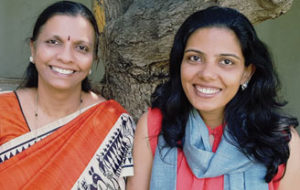Pi Ventures-backed Niramai Health Analytix detects breast cancer in a non-invasive and sensitive manner through the fusion of thermography and artificial intelligence. In the early days, to gain traction, the company aims to offer this as an alternate screening model by conducting clinical trials with well-known hospitals to convince them about the solution’s utility.

A World Health Organization (WHO) report suggests that one in every eight women in the US is at the risk of developing a breast abnormality in their lifetime. While a major cause for concern, it is also heartening to know that early detection goes a long way in treating the cancer.
Geetha Manjunath and Nidhi Mathur set up Niramai Health Analytix in 2016 to develop a solution that would help in detecting this type of cancer at a very early stage. NIRAMAI, which stands for ‘Non-Invasive Risk Assessment with Machine Intelligence’, has developed a cancer screening software that uses machine intelligence over thermography images, requiring minimal human intervention. In fact, the solution can detect tumors five times smaller than what a clinical examination can detect. This apart, it takes care of the more sensitive part of the screening – it is non-contact, painless and free of any radiation.
However, this has not been an easy journey for the company as it faced a lot of scepticism from hospitals and doctors, to begin with. “And understandably so,” says Manjunath. She explains, “Thermography has not been a part of the approach so far. We had several dialogues with them explaining that this is not thermography alone, butsomething we call thermalytix (a fusion of thermal images and data analytics), which can make a critical difference to the process. So, changing the mindset and getting positive acceptance from the doctors took multiple meetings.”
Skillset to their aid
Given the founders’ qualification and background, they have succeeded so far in convincing the end users – hospitals and diagnostic centres –of the solution’s utility value. The founders, who worked with Xerox in its research centre, understand the science behind thermal imaging technology well. Manjunath, who is a PhD in data analytics from the Indian Institute of Science, has developed innovative solutions in data analytics while Mathur, who was a senior product manager at the Xerox Research Centre, adds the business element to Niramai through her expertise in marketing and strategy planning. To address the growing incidence of breast cancer, they decided to use their image processing knowledge in a medical context.Eventually, the duo worked with a hospital where they used AI and machine learning for predictive analysis and risk assessment in healthcare. “We were collaborating with hospitals regarding some healthcare analytics projects in my laboratory and that’s when we came to know that breast cancer can be detected through thermal analysis.But there are not many experts, who can read the thermal images accurately,” states Manjunath.So, the two founders decided to use AI and machine learning to aid in this analysis and set up Niramai.
NARIMAI’s solution can detect tumours five times smaller than those detected during a clinical examination. This apart, it takes care of the more sensitive part of the screening – it is non-contact, painless and free of any radiation.
A model that evolved
Niramai was started through a collaboration with one of the hospitals for data collection. “Initially we started with detecting the tumour location in the last stage patients to help them in the treatment process,” states the CEO. But while doing this, they understood that their techniques can be used for identifying whether it is cancer or not, even during the early stages. And now the company has screened more than 400 patients and has observed that the AI algorithm can accurately detect whether the tumour is cancerous or not.
Currently, it is working with three hospitals in Karnataka to test its solution. While the company was incorporated in July 2016, the research work started three years prior to that. “Now we are collaborating with more hospitals,” says she.
In the last one year, the company has made the tool easily usable to any clinician to capture the data and has also standardised the report format such that any radiologist can make the observation using this report. The team of six (out of which four work in software development and R&D) has also fine-tuned their algorithm for higher sensitivity so that they can detect all positive cases. The company has filed for 10 patents and has been granted 2 so far.
Screening options
The most popular way of detecting breast cancer is through mammography and ultrasound, but most commonly used method is physical examination by oneself or a clinician to see if they can detect any lump. However, in order to be able to detect the lump, it has to be at least one and half cms or above. But, by that time it is already late in the stage of cancer growth, with a 50 per cent survival rate in India. There are other methods such as mammogram which can detect it slightly earlier, but women don’t opt for it unless they suspect a tumour. This apart, mammography also emits radiation. Thus, currently no method for early screening of cancer that can be used regularly in a non-invasive manner is available. “So Niramai tries to address this major need. We don’t touch or inject anything into the patient. We just scan the patient. Privacy and sensitivity is one of the primary reasons why people don’t want to do a regular screening,” says Manjunath.In Niramai’s solution, the patient walks in and in about 15 minutes a device captures images, analyses and generates the report for the doctor to finally certify. The company’s solution costs just 1/6th of a mammography machine and is portable.
It has two business models. It provides end-to-end solution for hospitals and diagnostic centres. “Ours is a software tool, but we partner with a hardware vendor to deliver a complete solution to hospitals and diagnostic centres,” states Manjunath. These centres may not be able to invest in a mammography machine. Mammogram also does not work on women under 45 years of age. The founding duo believe Niramai’s technology complements these mammogram machines.

The company also offers its solution on lease to NGOs, for government campaigns, and corporate programs for its women employees as and when needed.
Next stage
The company had to strengthen its IP and perform clinical trialsfor which it required funds. Finding good investors aligned with its vision was a challenge. However, it overcame this and has recently raised funds from Pi Ventures, an early-stage venture fund, Axilor Ventures, impact investor Ankur Capital, Silicon Valley-based startup accelerator 500 Startups and Flipkart co-founder Binny Bansal.
Hospitals are also slowly opening up to their solution and are willing to collaborate. The co-founders are also confident that the clinical trials they are planning with well-known hospitals will help in answering a number of questions that the medical fraternity has and convince them about the solution’s utility.
Going forward, the company plans to take its solution to as many hospitals and diagnostic centres as possible and provide this as a regular screening methodology or complementary to other options. It also serves as a good source of second opinion. As we conclude this interview, Manjunath stresses that breast cancer screening is a sensitive issue among women for many reasons and that their solution not only addresses all these but also takes care of women’s sensitivities.
Problem: There are not many cost-effective, non-contact, radiation-free approaches to screen for breast cancer. Additionally, detecting breast cancer in the early stages using mammography is turning out to be a challenge.
Solution: Niramai’s solution uses a cancer screening software that is non-contact, radiation-free and cheap (compared to existing equipment).
Technology: The company’s fusing thermal imaging technology combined with machine learning and data analytics, to screen for breast cancer. The thermal imaging technology ensures a radiation-free approach, while machine learning for analyze data gathered ensures the ability to detect the cancer in the early stage.
Snapshot: Niramai Health Analytix
Year: 2016
Founders: Geetha Manjunath and Nidhi Mathur
Headquarters: Bengaluru
Funding: Raised funds from Pi Ventures, an early-stage venture fund, Axilor Ventures, impact investor Ankur Capital, Silicon Valley-based startup accelerator 500 Startups and Flipkart co-founder Binny Bansal.


